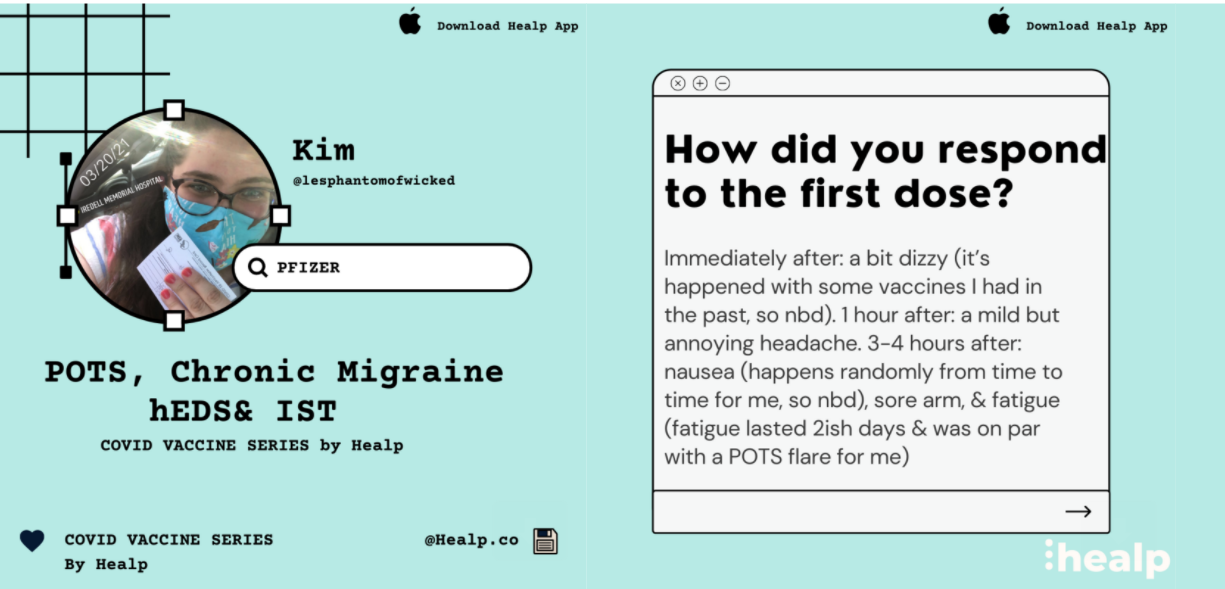When Elizabeth Tikoyan set out to create an app for people with autoimmune and chronic health issues last February, she didn’t anticipate that her plan to partner with hospitals and health groups would be interrupted by a global pandemic.
“That strategy went out the door because all the hospitals were like, ‘I’m sorry, we are so overbooked, our volunteer departments are shut down,'” Tikoyan said. “But we actually had a few groups reach out to us during that time [saying] ‘People are lonely, they don’t know people’, and so we shifted our entire strategy for growth on social media.”
It ended up being a turning point for her Healp app, which allows people with the same health conditions to speak to each other one-on-one and ask questions about treatments, as well as crowdsource info on more common afflictions. The app, built with Apple’s Xcode, currently has 5,000 users from 72 countries. The company is headquartered in Fairfax, Virginia, where about half of the team is based.
Tikoyan said Healp grew out of her own experience following a misdiagnosis of Lyme disease.
“I wanted to meet other people going through the same thing, like did you go to school? Did you end up falling in love? All these questions that go into your mind when you’re sick,” Tikoyan said. “I knew that there were people out there, I just couldn’t find them.”
Users can build a profile card with their name, location, diagnosis and personal info, like passions or interests. While Tikoyan specified it is not a dating app, it follows a similar structure to Tinder or Bumble, allowing people to enter the database and swipe right or left, then start talking to people with similar conditions. She said some are there for health questions, like how people reacted to medications or treatments. Others use it for social questions, like how to talk to partners about their conditions.
“Doctors don’t take what they prescribe and so we, as a community who have chronic illnesses disabilities various health conditions, we want to know what other people are experiencing with what they’re taking,” Tikoyan said.
There’s also a crowdsourcing element, where users are surveyed on common conditions like cramps, headaches and IBS. The app then collects and publishes the responses for users to browse through, with topics like top treatments or recommended doctors. The latest effort is around people’s experiences getting the COVID-19 vaccine, which is particularly popular seeing as there’s very little data on how those with weakened immune systems or autoimmune disease respond to the vaccine. It also lets people share personal tips around the overall vaccine experience, like whether or not a distribution site will let you bring in a service dog.

Elizabeth Tikoyan (Photo via LinkedIn)
“I know that’s not the general protocol of what you should be doing, but there’s no answers out there about these issues,” Tikoyan said. “We saw that patients were really trusting other people’s experiences and — this happens a lot with chronic illnesses because there’s no cure — you literally live the rest of your life with all these symptoms and so you’re just looking for the best next thing.”
While it doesn’t replace going to the doctor, Tikoyan hopes that sharing experiences can help patients better advocate for themselves and have a stronger voice in their own health discussions. Going forward, Tikoyan hopes to expand the app’s audience beyond Gen Z and millennials, which she said make up about 80% of the userbase at the moment.
But overall, she hopes Healp can serve to remove some of the stigma around these long-term health issues.
“Sometimes it’s the community of people that get you that can really help you get to the next level,” Tikoyan said. “We really want to be a space where the stigma of having health issues does not exist.”
Before you go...
Please consider supporting Technical.ly to keep our independent journalism strong. Unlike most business-focused media outlets, we don’t have a paywall. Instead, we count on your personal and organizational support.
Join our growing Slack community
Join 5,000 tech professionals and entrepreneurs in our community Slack today!

Entrepreneurship is changing, and so is the economic development behind it

Tech Hubs’ new $210M funding leaves Baltimore and Philly off the table

Here’s what to know before using AI to craft your brand’s social media posts


